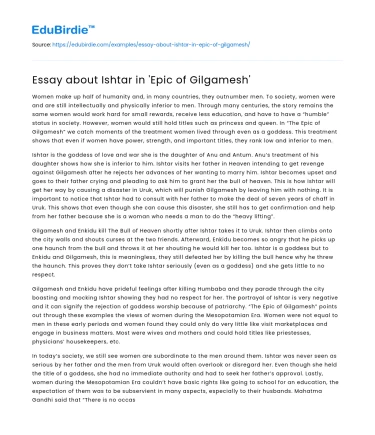Women make up half of humanity and, in many countries, they outnumber men. To society, women were and are still intellectually and physically inferior to men. Through many centuries, the story remains the same women would work hard for small rewards, receive less education, and have to have a “humble” status in society. However, women would still hold titles such as princess and queen. In “The Epic of Gilgamesh” we catch moments of the treatment women lived through even as a goddess. This treatment shows that even if women have power, strength, and important titles, they rank low and inferior to men.
Ishtar is the goddess of love and war she is the daughter of Anu and Antum. Anu’s treatment of his daughter shows how she is inferior to him. Ishtar visits her father in Heaven intending to get revenge against Gilgamesh after he rejects her advances of her wanting to marry him. Ishtar becomes upset and goes to their father crying and pleading to ask him to grant her the bull of heaven. This is how Ishtar will get her way by causing a disaster in Uruk, which will punish Gilgamesh by leaving him with nothing. It is important to notice that Ishtar had to consult with her father to make the deal of seven years of chaff in Uruk. This shows that even though she can cause this disaster, she still has to get confirmation and help from her father because she is a woman who needs a man to do the “heavy lifting”.
Save your time!
We can take care of your essay
- Proper editing and formatting
- Free revision, title page, and bibliography
- Flexible prices and money-back guarantee
Gilgamesh and Enkidu kill The Bull of Heaven shortly after Ishtar takes it to Uruk. Ishtar then climbs onto the city walls and shouts curses at the two friends. Afterward, Enkidu becomes so angry that he picks up one haunch from the bull and throws it at her shouting he would kill her too. Ishtar is a goddess but to Enkidu and Gilgamesh, this is meaningless, they still defeated her by killing the bull hence why he threw the haunch. This proves they don’t take Ishtar seriously (even as a goddess) and she gets little to no respect.
Gilgamesh and Enkidu have prideful feelings after killing Humbaba and they parade through the city boasting and mocking Ishtar showing they had no respect for her. The portrayal of Ishtar is very negative and it can signify the rejection of goddess worship because of patriarchy. “The Epic of Gilgamesh” points out through these examples the views of women during the Mesopotamian Era. Women were not equal to men in these early periods and women found they could only do very little like visit marketplaces and engage in business matters. Most were wives and mothers and could hold titles like priestesses, physicians’ housekeepers, etc.
In today’s society, we still see women are subordinate to the men around them. Ishtar was never seen as serious by her father and the men from Uruk would often overlook or disregard her. Even though she held the title of a goddess, she had no immediate authority and had to seek her father’s approval. Lastly, women during the Mesopotamian Era couldn’t have basic rights like going to school for an education, the expectation of them was to be subservient in many aspects, especially to their husbands. Mahatma Gandhi said that “There is no occasion for women to consider themselves subordinate or inferior to men.” There has been a progression in treating women as equals to their male counterparts but it is important to continue to gain insight into women in society.






 Stuck on your essay?
Stuck on your essay?

